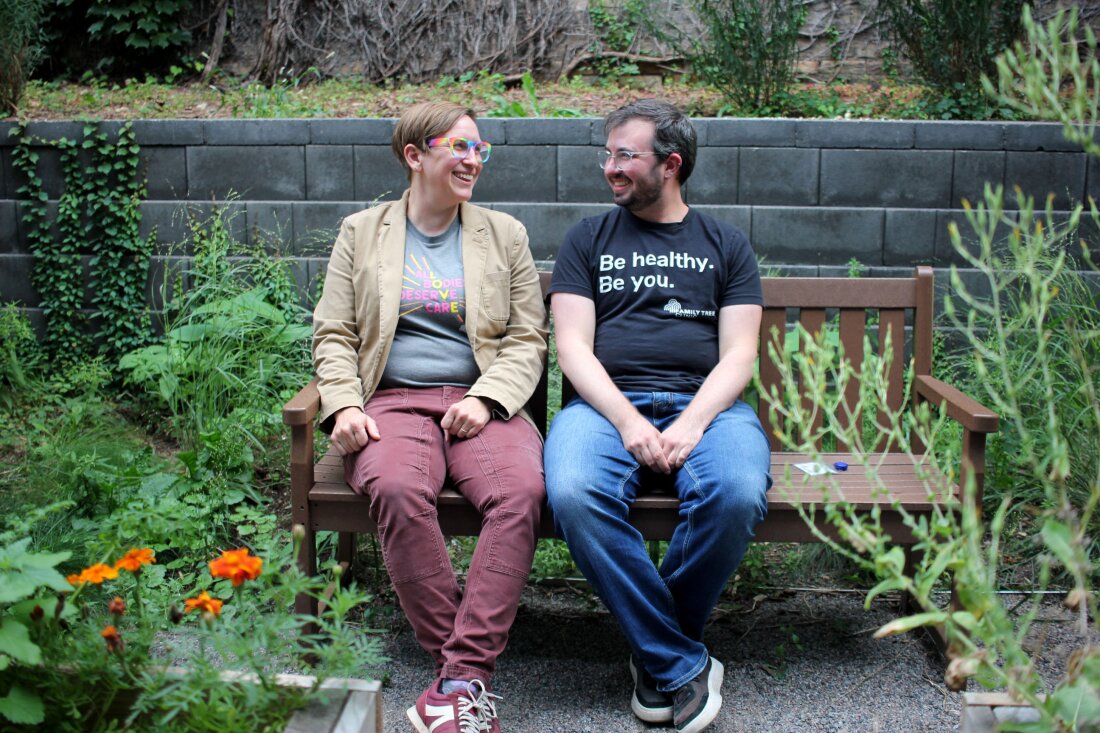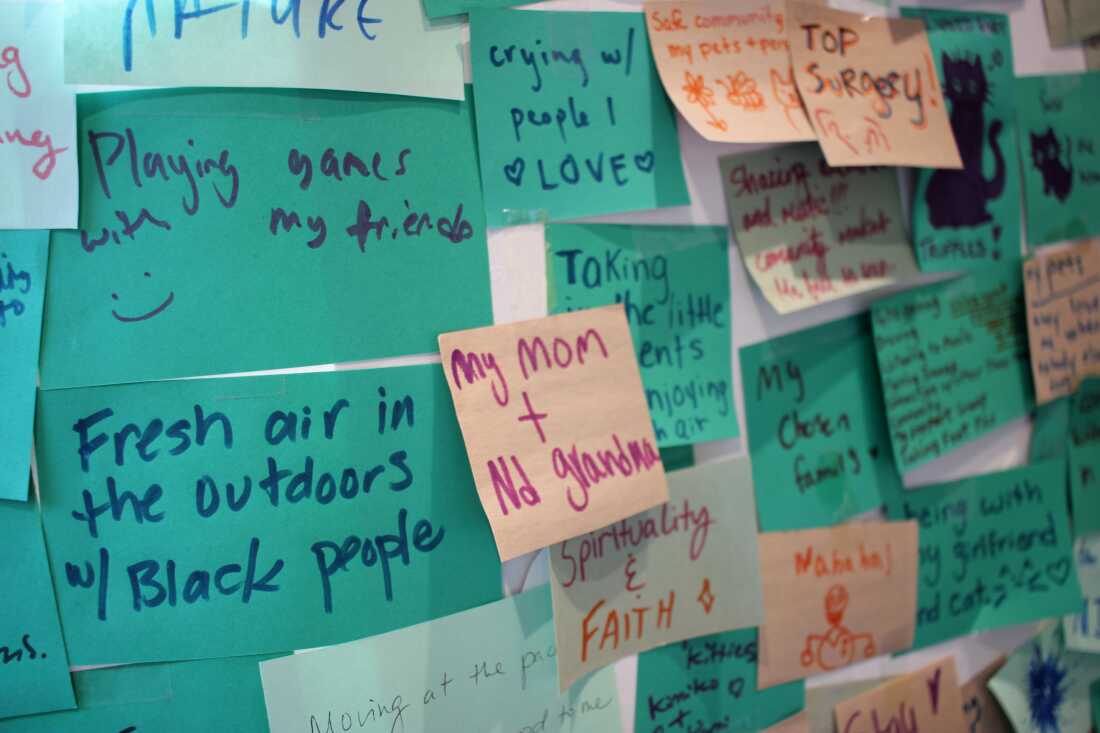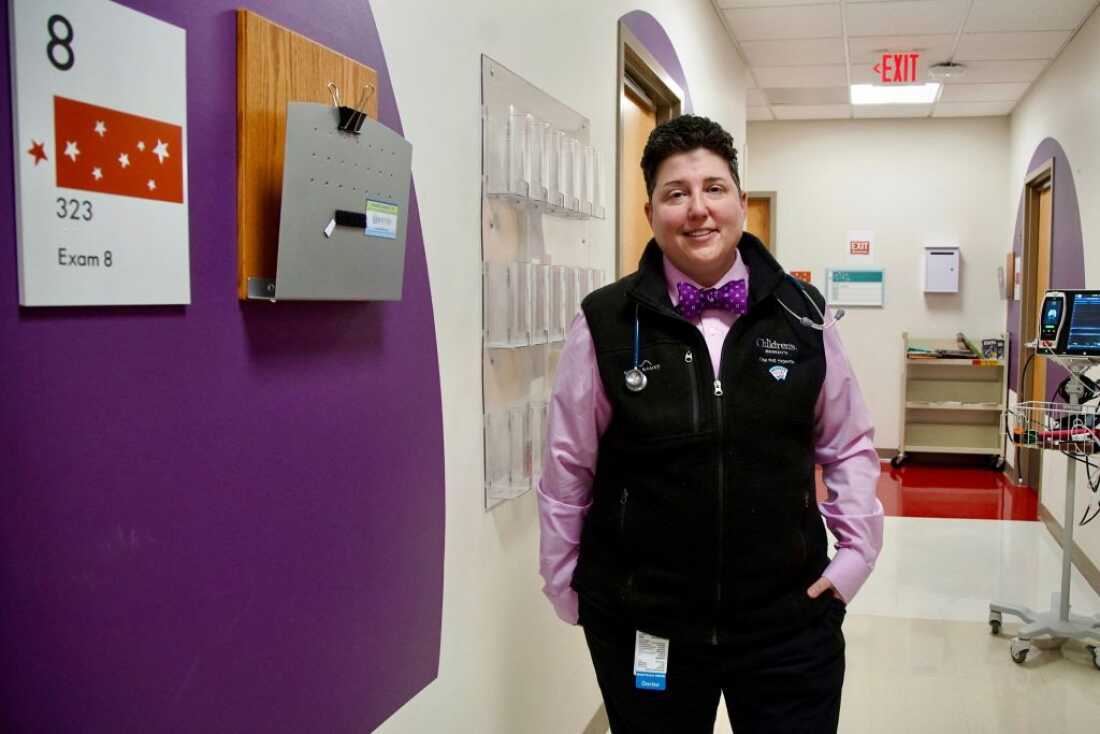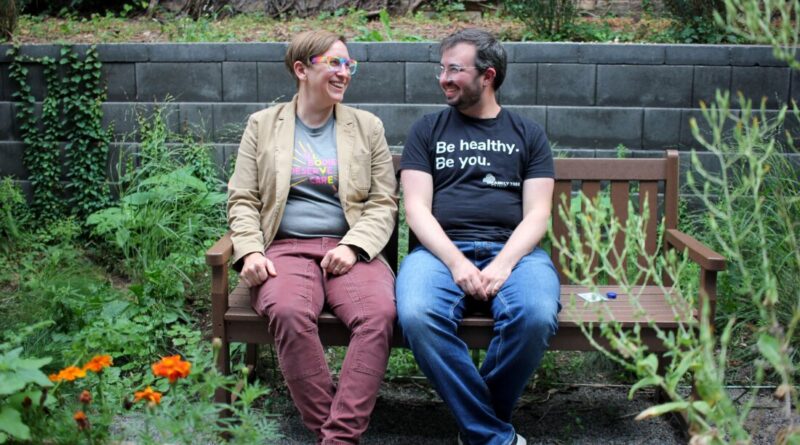Minnesota is a haven for trans health care. Here is how doctors meet the demand

Dr. Kelsey Leonardsmith (left) and colleague Dylan Flunker in the Family Tree Clinic garden in Minneapolis. The two run a program to train more doctors and nurses in the area to be able to provide gender-based care, which is legal in Minnesota, but banned for teenagers in many states around the country.
Selena Simmons-Duffin/NPR
hide description
toggle caption
Selena Simmons-Duffin/NPR
Foster care for teenagers is banned in Iowa, North Dakota and South Dakota. It has been banned in more than 20 other states across the country, following a series of laws over the past two years.
Then, there’s Minnesota, which went the other way, passing a bill last year that made the state a “trans sanctuary.”
Dr. Kelsey Leonardsmith, director of gender-based youth care at the Family Center in Minneapolis, says: “We are this island in the middle of countries that block and block people from entering. He says it is difficult to provide this attention in the political environment.
He says: “There are two things you can choose from, you can be scared and say, ‘I don’t know if we can do that.’ “Or you can take a deep breath and say, we know the work we are doing. We are looking at research. We’ve been doing this for a long time, and we’re doing a great job – our patients are crying tears of joy in this building. “
Providers such as Family Tree and others NPR spoke to said they are adapting as quickly as they can to accommodate the influx of out-of-state patients.

Instead of panicking, Leonardsmith says, “one thing you can do is say, ‘We’re going to do it, we’re going to do it more, and we’re going to teach everybody. how to do that. do it, too.’”
That feeling is how the Family came to run the Midwest Trans Health Education Network. So far, they have trained about 50 health providers from all over the region, including rural areas. Over eight sessions, they prepare members of each group to be able to care for trans patients.

Family Tree Clinic shares their training with participants in the Midwest Trans Health Education Network. This form seeks to understand the patient’s goals in seeking gender confirmation care
Selena Simmons-Duffin/NPR
hide description
toggle caption
Selena Simmons-Duffin/NPR
That goes beyond the medical education involved, to some of the bureaucracy.
“A lot of it is: ‘Here, these are patient gifts, intake forms, letter templates for when you have to fight with the insurance company,'” Leonardsmith explains. He is leading this initiative with project manager Dylan Flunker.
Trans patients from the area are now making their way to Minnesota causing problems, clinic staff say.
Last year, “for our small clinic, we saw over 200 people from out of state,” says Family Tree executive director Annie Van Avery.
Children’s Minnesota has also seen an increase, with a 30% increase in calls to its sexual health program and the hospital has hired more doctors to help. A Minneapolis pediatrician told NPR that he personally treats 15 patients who come in from out of state.

The restrictions have caused financial hardship for patients and providers. For patients, traveling abroad for care can mean less follow-up, as well as travel costs for things like gas and hotel rooms, and time away from work. For hospitals and clinics, the patients’ health insurance usually does not reimburse foreign doctors.
Family Tree uses a sliding scale and doesn’t turn away patients who can’t pay, Van Avery says. He says: “We are doing a service – now – for other countries, and we want to be able to continue that access, but it is a huge financial burden and a challenge.”

The Family Tree clinic’s waiting room displays answers from patients to the question: “Where does your healing come from?”
Selena Simmons-Duffin/NPR
hide description
toggle caption
Selena Simmons-Duffin/NPR
Across town, Dr. Kade Goepferd, a pediatrician who directs the sexual health program at Children’s Minnesota, said many of her patients’ families end up moving out of state, rather than making regular visits for appointments.
“Now it’s the people of Minnesota,” says Goepferd. “Knowing they’re coming [move]they called and got on our waiting list ahead of time.” Even after hiring more clinical staff, the wait for a program can still take a year.
For families with young children, such as 5-year-olds who are already strongly expressing a transgender or nonbinary identity, it is possible to wait months to reach an agreement because gender equality care for those ages it’s just talking.
“We have some families who will call us with their young children to ask us, ‘How do I talk to my grandparents?’ Should they choose their own clothes? What if they ask to be called by a different name – how do we deal with that?’ So they just want support,” says Goepferd.
Time becomes more important as patients get older. Teens and their families may decide to use birth control pills or sex hormones or both. (Surgery is more common in children.)
These are the types of interactions that some lawmakers oppose, despite the fact that major US medical organizations, including the American Medical Association and the American Academy of Pediatrics, support the experience.
When lawmakers in Iowa, Minnesota’s neighbor to the south, debated the state’s ban last March, the bill’s sponsor, Rep. “Our children deserve time to grow in themselves, to find themselves, to go through stages, without medical measures that are not guaranteed by their success,” he said.
Goepferd emphasizes that a sexual health program is not like a tunnel where you go in as a boy and come out as a girl — or vice versa. Every patient is different and there is room for that variety.
They explained: “The schedule is set by the children and families, not us. “They may or may not end up using medication, they may or may not change socially, they may or may not change their identity over time – the goal of I can help them succeed.”

Dr. Kade Goepferd directs the Child Health Program in Minnesota. As a pediatrician who works with trans and non-binary children, she has spent a lot of time at the statehouse trying to educate lawmakers. They say: “If I can’t get the right information and I can’t help create the cultural change that trans kids need, the medical care I provide won’t make a difference.”
Agnes Bun/AFP/Getty Images
hide description
toggle caption
Agnes Bun/AFP/Getty Images
They say care is slow and thoughtful and multidisciplinary. “We work with our rehab team on speech disorders; we work with our psychiatry team, with medication management. We have nursing care that helps families find appointments and supplies and things like that. “
With all the political attention on transgender children right now, Goepferd has also spent a lot of time recently in the Minnesota statehouse, as legislation affecting their patients has emerged. They say: “Sometimes it takes a pediatrician to stand on the stage and correct the misinformation. “I had silly questions from lawmakers, but I also had real questions from lawmakers who were trying to understand.”
That public service has had a personal cost. Goepferd said they received death threats. But they don’t plan to stop.
“If I can’t get the right data, and I can’t help create the cultural change that these kids need, the medical care I provide won’t make a difference,” says Goepferd.
After all, they say most of the things that affect a child’s health happen outside of the doctor’s office.
#Minnesota #haven #trans #health #care #doctors #meet #demand
